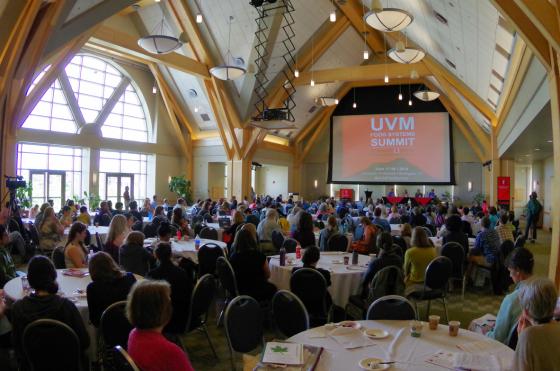Posted March 17, 2015 at 08:30am by Erica Houskeeper
The Right to Food: Power, Policy, and Politics in the 21st Century

All people deserve access to adequate, nutritious food. The complicated and provocative question for the fourth annual UVM Food Systems Summit on June 16-17 is how to provide this basic human right.
Globally and in Vermont, the stakes are profound. According to the United Nations Food and Agriculture Organization, one in nine people worldwide are chronically hungry. According to the U.S. Department of Agriculture, 13 percent of Vermont households are food insecure. The challenge of “feeding the world” is complicated by income inequality, environmental constraints, technological limitations, climate change, and a growing world population. This multi-dimensional challenge calls for interdisciplinary responses.
At the UVM Food Systems Summit, international and national food movement leaders – including renowned food rights activist Raj Patel – will join with scholars, farmers, scientists, philanthropists, business leaders and students, among other food system stakeholders, to discuss and debate pathways and challenges to food security.
Facing questions that cross boundaries between law, policy, science, technology, and agriculture, UVM is partnering with Vermont Law School’s Center for Agriculture and Food Systems to host the summit. This partnership is meant to foster transdisciplinary scholarship between both schools and facilitate a dynamic dialogue on innovative ways to improve the food system.
“UVM and Vermont Law School are leading academic institutions in the study of food systems, and together are working to enhance our understanding of food systems, from local to international. Vermont is a small state, but our communities are similar to other communities anywhere, and what we learn about community food systems can be applied globally,” said Doug Lantagne, director of the UVM Food Systems Initiative. “The summit is an opportunity for food systems researchers, practitioners, farmers, food businesses, and engaged community members to come together and determine what is needed to ensure that all people have access to adequate and nutritious food.”
The summit is open to the public and the organizers are seeking participation from nonprofits, government, farmers, and food producers. During the two-day conference, sessions will address the following themes: the biophysical constraints to feed the population, the impact of geopolitical context on our food system, and the implications of behavior and culture.
“Food advocacy is a unique vehicle for systems change, and the UVM Food Systems Summit is a unique opportunity for the academic and agricultural communities to come together to find food systems solutions,” said Laurie Ristino, director for the Center for Agriculture and Food Systems at Vermont Law School. “We need to establish policy initiatives which improve the food system by addressing its impact on the environment, public health, local economies, food security and animal welfare. We cannot live without food and yet to fix that, which is most essential and personal to us, we must understand its global nature.”
Three keynote speakers will each provide a one-hour talk, as well as participate in a panel discussion at the end of the summit:
Raj Patel is a research professor in the Lyndon B. Johnson School of Public Affairs at the University of Texas, Austin, and a senior research associate at the Unit for the Humanities at Rhodes University in South Africa.
Claire Kremen is a professor in the Department of Environmental Science, Policy and Management at the University of California, Berkeley, and co-directs the Center for Diversified Farming Systems and the Berkeley Food Institute at the University of California.
Smita Narula is a fellow in human rights and public policy at the Roosevelt House Public Policy Institute at Hunter College. She is a human rights advocate, attorney, and academic who has worked globally to promote and defend sustainable access to nutritious food as a fundamental human right.
In addition, panel discussions with international, national, and regional experts will feature research and examples of how the right to food is playing out in a globalized food system.
Panelists include scholars and leaders from a variety of organizations and institutions, including Syracuse University, the University of KwaZulu-Natal in South Africa, CATIE Tropical Agricultural Research and Higher Education Center in Costa Rica, the University of Idaho College of Law, the University of South Carolina, the Vermont Farm to Plate Network, and the Vermont Youth Conservation Corps. To promote dialogue among all participants, all sessions will include time for Q&A and engaged dialogue with the audience.
The UVM Food Systems Summit will be held at the UVM Davis Center. For more information and to register, visit www.uvm.edu/foodsystemssummit.
